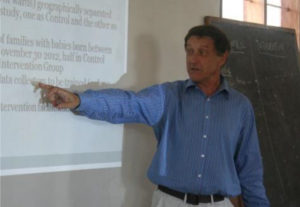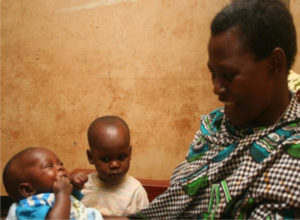Illogan parishioners’ Zumm Project helps to teach the world to read
An innovative project encouraging parents to talk to their babies is raising literacy rates in Tanzania and could soon be used across many developing countries.
The brainchild of David and Jan Townend, two retired teachers now living in Illogan Parish, ZUMM was developed after the couple noticed that mothers in Tanzania were not speaking to their babies.

David Townend
“Everywhere we went, we saw young babies with lively eyes, obviously curious but silent. When we asked about it we were told that families start talking to the babies when the babies start talking,” said Jan, a speech and language therapist who is an expert in child literacy.
Jan says that through their work in the country as teacher trainers they knew there was a big issue with illiteracy and after talking with colleagues and local people, the couple realised that the language environment of Tanzanian babies was very poor. “Talking to a baby is learned behaviour. It seemed parents didn’t know how important it was to talk to their babies, or how to do it.”
There is unequivocal international evidence for the importance of a rich language environment in the first year of life. Babies who are spoken to from birth will talk earlier and this lays the foundation for success in learning to read and write at school. David said: “We talked to many influential people over two years and gathered a good deal of enthusiasm for the idea as people began to realise its importance.”
Using contacts built up over four years of living and working in Tanzania, the couple were able to take their idea to the government. ZUMM, or Talk to Your Baby, began life as a two day workshop sponsored by the Ministry of Education.
It was then that the couple realised that African research was needed. David said: “ZUMM is the first study of the language environment of babies in the first year of life in Africa.”
The couple began pre-pilot work with families in Mvumi, the community in which they had first lived. 
“We knew two churches there, and the people knew and trusted us,” said Jan. “We trained a small group of 15 mothers to talk to their babies and how to make toys out of things they had. They really got it,” said Jan, “As the babies responded by smiling and making sounds, the mothers came to see them as lovely, intelligent little people. Little did we foresee that the village would never be the same again!
“When we went back three weeks later, we discovered they had gone home and talked to their sisters and neighbours and the group had grown to 26 and a lot of them had already made little toys. Six months later, there were 45 mothers in the group. Two of the ladies from the church had started reinforcing the messages and had opened the church for the mothers to come in and talk and play with their babies once a week and share experiences. That group has now grown to 100, all crowding into the building and includes fathers.”
Working with Children in Crossfire, a UK based NGO specializing in young children in Tanzania, ZUMM then received funding from a Swiss Bank which meant they were able to study to over 1000 families in four regions of the country.
It is not just families that ZUMM workers are training. It has also reached out to Community Health Workers, local birth attendants, nurses, midwives, Community health coordinators, and education and health officials at all levels of Government. Part of their vision is to take ZUMM into schools. “We want to teach the pupils about it because they will be the parents of the future.”
David said: “ZUMM has shown that a training programme can make a huge difference. Our research involved counting the words used per hour to babies and at the beginning it was only around 60 per hour compared to places like the UK where it is 600-2000 words per hour. In our study within six months there had been an increase of 80% in the number of words spoken to the babies, in the groups who had received training, compared to control groups, and village elders were making comments about how they’d never seen such intelligent children!”
The programme has proved so successful that David and Jan were invited by DFID to speak to international development policy-makers at a conference into early childhood development in London recently. Jan said: “We had been told by the World Bank that there are at least 86 less-developed countries in need of ZUMM, so this was a great opportunity to share our findings with a wider audience. ZUMM is becoming international.”
Jan and David are now trying to secure funding (£500,000) to develop an on-line learning platform which will be a repository for the expertise, evidence and experience gained. It will be free at the point of use in Tanzania and elsewhere.
Jan said: “In more developed countries, like the UK, parents learned many years ago to talk to their babies; it is ironic that now that we know why it is so important, many mothers seem to spend a great deal of time on their phones when they could be talking to their babies.”
Back in Mvumi, of those families already taking part in ZUMM, the group continues to meet weekly and has around 100 mothers and babies. David said: “The groups have proved so popular that when the children reach two years old it has now been agreed they will leave to make space for younger ones to join. So that’s led to our next challenge!”
In June, David and Jan will be leading a group of 11 from their local parish, St Illogan, on a visit to Tanzania, mainly in Mvumi. While there the group will work with local people to turn the village’s old, small church into a playgroup or pre-school room for those leaving the ZUMM group to move into.
David said: “This will be a shared effort. The Mvumi people are experts in local building materials and methods so they will lead on that and the visitors will be helping to show people how to make toys and games out of what is available (mainly rubbish!) and assisting Jan and David in training the supervisors, and educating the parents to create a rich learning environment.”
The congregations of St Illogan Parish have supported the project with £2,000 raised through fundraising activities, just one of many initiatives the parish has supported in Tanzania.
Jan said: “We moved to Cornwall when we’d retired and the congregation knew we were involved in Tanzania. A partnership was suggested. We spoke in church and said if anyone was interested in what we were doing to come and have a chat and at the end we were overwhelmed with people! It’s ended up being something the whole parish is involved in. So St Illogan Parish is now linked to St Andrew’s in Mvumi.”
This partnership has been successful and has provided much needed support for the African community from assisting them with building a new church and a pastor’s house to ensuring there is always the funds for Communion wine. “We get involved in supporting them although our whole principle is not to take over,” said David.
Perhaps one of the most important initiatives to come out of the partnership is the setting up of a Hardship Fund, which has now been running for nine years. Jan said: “A church isn’t buildings and so we encouraged them to set up a partnership committee made up of lay people and clergy which meets once a month. They provide grants for food or medical needs and the money comes from the fundraising we do here in Cornwall.”
Each grant given by the Hardship Fund is enough money to feed a family of four for four weeks and around ten families in the village receive this help each month.
David said: “When it started they did ask, is this money just for the church people or for everyone? We felt it was important that it was for everyone and it has turned out to be part of their Christian witness in the village. People are amazed that the church is doing this. The culture is you look after your own and the fact the church is giving to people who are nothing to do with it is amazing to them. But the needs are so huge.”
So large in fact that a request was made recently to see if the amount given to the Hardship Fund could be doubled. Jan said: “Across our parish we held a number of fundraising events which were so successful that now we are able to go back to them and double the money.”
While Jan and David are keen to encourage others to consider these types of partnerships, they are equally keen to ensure people understand the commitment. “This isn’t something you can just start and then stop. It had to be an ongoing commitment so we had to be sure it was sustainable.”
And in June, the couple’s vicar Revd Steve Robinson and eight others will get to see first-hand what their commitment means. Jan said: “We have already learnt so much and we are keen to share it. It is also important more people are able to see and tell the stories. We’ve been preparing them by teaching them about the culture and they’ve all learned some of the language. Everyone is expecting to be changed by the experience.”




